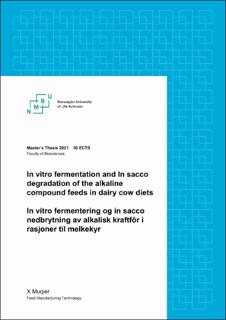In Vitro fermentation and In sacco degradation of the alkaline compound feeds in dairy cow diets
Master thesis

View/
Date
2021Metadata
Show full item recordCollections
- Master’s theses (BioVit) [348]
Abstract
The primary aim of this work was to test the in vitro fermentation kinetics and in sacco rumen degradation of different formulations of alkaline treated local grains in the dairy cattle diet, in contrast to soy-based compound feed. Furthermore, the effect of mixing these compound feeds with three different qualities of grass silages was tested. Hypothesis, and operating procedures are based on the knowledge of ruminant nutrition, physiology, and feed science as introduced in the theoretical backgrounds. The methods used to study degradation kinetics were: 1) DM disappearance of 4 types of compound feeds (AUMD – alkaline feed with 20% Alka 150 diet containing higher proportion of local ingredients; AUNA- feed with ingredients of AUMD but urea and barely replacing the Alka 150 diet; AUAB- AUMD in a mash form; and DRER- Drøv Energirik which is a standard compound feed for dairy cows with higher level of imported ingredients) using the in sacco method, incubated in the rumen for different time intervals; 2) measuring gas production kinetics of 19 dietary treatments (the above four compound feeds, three different quality silages, and their mixtures in the ratio of 45:55% on DM basis, in respective order) fermented in buffered rumen fluid for 48h using the ANKOM RF gas production system. The alkaline treatment increased the crude protein content of the diets. There were no negative effects on the in vitro dry matter degradation (DMD), and in vitro gas production (GP) profile of the different formulations of alkaline grains. Besides, there was no difference in DMD and starch digestibility among alkaline feed AUNA and AUAB compared to the DRER using in sacco work. The AUMD had higher DMD than DRER (P<0.0001). Furthermore, higher digestibility of CP and NDF were observed in the contrast group (AUMD, AUAB, AUNA) compared with the control diet DRER. In addition, the GP and rate of GP of middle cut and late cut silage mixtures increased after they mixed with alkaline grain and soy-based concentrate.
